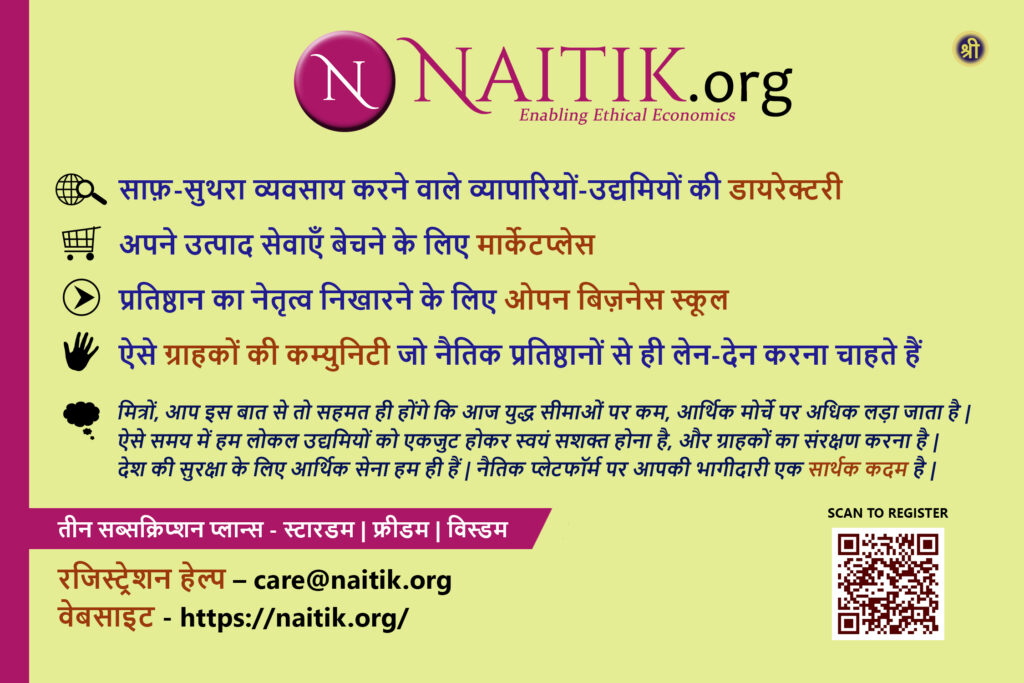How(?), The Naitik Framework
To enable ethical economics, we have addressed two questions – How to fix the selling behavior? How to fix the buying behavior?
How to fix the selling behavior?
Addwit Vyavsaay Upanishad was written two years ago. During tenth round of edits, emerged the ten doable ‘principles’ for ethically yet progressively doing the business.
The ten fundamentals for an ethical business are being adopted from the mega-book titled Addwit Vyavasaay Upanishad, currently available in Hindi only. Each partner business practitioner gets her/his personal copy. To buy a copy for yourself, click here and follow the shopping process.
- मन्तव्य ग्राहकों के लिए सेवाभाव, अपनत्व और सम्मान का हो Intent of enterprise to be of service, affinity and respect for customers
- जब आवश्यक हो ग्राहकों को शिक्षित और संरक्षित करना Educating and protecting customers when necessary
- भ्रष्टाचार और अनावश्यक हिंसा के लिए स्वीकार्यता नहीं Non-acceptance for corruption and unnecessary violence
- धन-पूँजी की समझ और उद्यमिता की समझ सामानांतर चलते हैं Fair understanding of capital-money and entrepreneurship go hand in hand
- उद्यमिता प्रत्यक्ष-अप्रत्यक्ष रूप से समाज-प्रकृति का पोषण- संवर्धन करे Entrepreneurship should directly or indirectly nurture and preserve the society and nature
- विस्तार, गुणवत्ता और सहयोग; किन्तु अनावश्यक आक्रामकता नहीं Scale, quality and collaboration; but not unwarranted aggression
- नेतृत्व की निरंतरता हेतु उद्यमी परिवार उपनिषद् की पद्धति में रहें Entrepreneurs’ family should follow the Upanishad method for continuity of leadership
- वैभव और समृद्धि, साधना के विषय हैं, भोग के विषय नहीं Abundance and prosperity are matters of Sadhana, not of enjoyment
- प्रत्येक भूमिका में प्रगति हेतु उद्यमिता एक अनिवार्य चारित्रिक गुण है Entrepreneurship is an essential trait for progress in every role
- उद्यमिता क्षेत्रीय सांस्कृतिक-आर्थिक आत्मनिर्भरता हेतु अनिवार्य है Entrepreneurship is imperative for regional cultural-economic self-reliance
How to fix the buying behavior?
Buyers, on the other hand needed to be awakened too, about how the market takes them for a ride and cheats them.
We are documenting cases of unethical business, cheating, corruption and irresponsible conduct of businesses on various themes accessible via Naitik Aware Buyers Community.
Also, a 30-page quick-read Kasht Customers Ke (pdf, print) is made available. The book outline ten disciplines that buyers must observe –
- शाम 7 बजे के बाद का समय खरीदारी करने के लिए नहीं। सायंकाल स्वयं से; परिवार से, बच्चों से और ईश्वरतत्व से जुड़ने का समय है No shopping hours after 7 pm. The evening; It’s time to connect with self, family, with children; and with God
- महीने / पखवाड़े में एक दिन बाजार जाने / खरीदी करने के लिए निषेध करना Prohibition for going to the market/purchasing one day in a month/fortnight
- भ्रष्ट और अनैतिक दुकानों से खरीदारी नहीं Do not buy from corrupt and unethical vendors / shops
- आवेगपूर्ण खरीदारी और समाज / मित्रमंडली में दिखावटीपन के लिए खरीदारी नहीं NO to impulsive buying and shopping for flaunting in society / social status
- वार्षिक आय/मासिक आय के X% से अधिक खरीदारी पर प्रतिबन्ध (यह X 50% से 70% के बीच हो सकता है | कृपया मार्गदर्शन ले लें) Limit (restrict) on buying more than X% of annual income/monthly income (X% can be between 50% and 70%. Please take someone’s guidance.)
- यदि नैतिक/स्थानीय विकल्प उपलब्ध है तो विदेशी उत्पाद की खरीदारी नहीं No purchase of foreign product if ethical/local alternative is available
- जब-जहाँ भी ऐसा दिखे कि भ्रामक बिक्री, मोहक बिक्री या दबाव डालकर बिक्री की जा रही है, वहाँ खरीदी से दूर रहना Avoid buying whenever it appears that there is a deceptive sale, an enticing sale or a coercive sale
- किसी भी ऎसी वस्तुओं, सेवाओं, खेलों, आदि के लिए भुगतान करने नॉन-नेगोशियाबाल “ना” जो व्यसन और लत का कारण बन सकती है Non-negotiable “NO” to pay for any goods, services, games, etc. that may lead to addiction
- नैतिक उपभोक्ता बनने हेतु एक-दूसरे को सूचित करने, एक-दूसरे के साथ सहयोग करने हेतु “हाँ” “YES” to inform each other, cooperate with each other to become ethical consumers
- परिवार के वार्षिक आय के 10% से अधिक के खर्चे सभी की आपसी सहमति के साथ ही किए जाएँ Expenses exceeding 10% of the family’s annual income should be done with mutual consent of everyone in family

